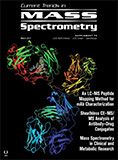Preview of the 65th Conference on Mass Spectrometry and Allied Topics
Special Issues
A brief preview of this year’s ASMS conference, taking place June 4–8, 2017, in Indianapolis, Indiana.
Photo credit: f11photo/Shutterstock

We present a brief preview of this year’s ASMS conference, taking place on June 4–8, 2017, in Indianapolis, Indiana.
The 65th Conference on Mass Spectrometry and Allied Topics is set to take place June 4–8 at the Indiana Convention Center in Indianapolis, Indiana.
Short courses get under way at 9 a.m. on Sunday, June 4, and continue throughout the day until 4 p.m.
A new feature of this year’s conference is four tutorial lectures in two parallel tracks on Sunday, starting at 5 p.m. In one track, Kermit K. Murray of Louisiana State University (Baton Rouge, Louisiana) will give a talk titled “MALDI: Past and Future,” and Donald F. Hunt of the University of Virginia (Charlottesville, Virginia) will pesent “Cancer Immunotherapy and Mass Spectrometry.” In the other track, Erin S. Baker of the Pacific Northwest National Laboratory (Richland, Washington) will give a talk titled “Ion Mobility Spectrometry: Analyzing Molecules as They Tumble through Life,” and Norman J. Dovichi of the University of Notre Dame (South Bend, Indiana) will present “CE/MS-Ready for Prime Time?”
The Sunday tutorials will be followed by the opening plenary lecture at 6:45 p.m. At that time, David S. Millington of Duke University Medical Center (Durham, North Carolina) will give a presentation titled “Towards a Good Start in Life: Neonatal Screening and Beyond.” Following the plenary lecture, a welcome reception will take place from 7:45 to 9:00 p.m. in the exhibit-poster hall. The reception is open to all conference attendees, and no special ticket is required. A small block of posters representing the work of undergraduate students will be on display. The full poster sessions will start on Monday morning.
Additional plenary lectures take place Monday, Tuesday, and Thursday at 4:45 p.m. Monday’s lecture will be the Award for a Distinguished Contribution in Mass Spectrometry. Tuesday’s lecture celebrates the Biemann Medal, and on Thursday, the Plenary Lecture will be the Closing Session, titled “Saving the Great Coral Reefs.”
Four new oral sessions will take place in this year: On Sunday morning during the 8:30 a.m. oral session, “Plant ‘omics’” will be presented. “Microorganisms: Identification and Characterization” will be part of the Tuesday afternoon discussion at the 2:30 p.m. oral session, and Thursday’s 8:30 a.m. oral session includes discussions titled “GC/MS/MS, GC/MS/MS, and GC/HRMS,” and “Fundamentals for Everyone.”
Thursday’s closing event at the Indiana State Museum, which is a short walk from the convention center, includes a buffet dinner, an IMAX showing that will be associated with Thursday’s closing session on the great coral reefs, and a ride on one of the canal gondolas.
ASMS 2018
The 66th Annual ASMS Conference will be held June 3–7 in San Diego, California. For more information, visit www.asms.org in the coming months.
Cindy Delonas is the associate editor for Spectroscopy. Direct correspondence to Cindy.Delonas@ubm.com

Regulatory Deadlines and Supply Chain Challenges Take Center Stage in Nitrosamine Discussion
April 10th 2025During an LCGC International peer exchange, Aloka Srinivasan, Mayank Bhanti, and Amber Burch discussed the regulatory deadlines and supply chain challenges that come with nitrosamine analysis.









